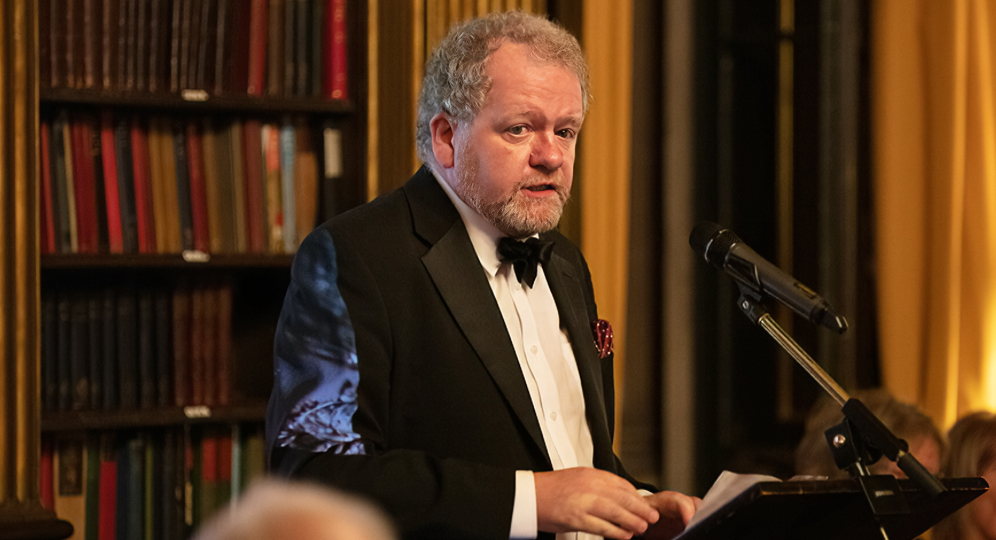Professor Francis O’Gorman (1967-2024): A Tribute

Trollope Society members were saddened by the untimely passing of Professor Francis O’Gorman. Francis was a great Trollopian and a close friend to the Society. He frequently participated in the Society’s online BIG READs, delivering talks on Framley Parsonage, The Way We Live Now, and Orley Farm. Recently, he had joined as a Trustee of the Trollope Society. We are deeply thankful for his support and contributions to the Society, and his absence will be keenly felt by all.
The following tribute by Simon Rennie, Associate Professor of Victorian Poetry, University of Exeter, was first published on the BAVS (British Association of Victorian Studies) website and is reproduced here with Professor Rennie’s permission.
Many members of BAVS will have been deeply saddened to learn of the untimely passing of Professor Francis O’Gorman on the 11th of April 2024. After a long battle with cancer, Francis died peacefully in his garden, looking at the tulips he had planted, in the company of his wife, Kate Williams. Having held the post of Saintsbury Professor of English Literature at the University of Edinburgh since 2016, Francis retired for the last years of his life to deal with his illness, play the organ, and enjoy his garden. He remained active on social media, posting on literature, philosophy, and horticulture subjects. Occasionally he would post images of knotty musical conundrums from organ scores.
Francis O’Gorman’s academic career was distinguished, varied, and impressively productive. Having been the college C.S. Deneke organ scholar at Lady Margaret Hall Oxford, where he also directed the college choir, Francis achieved a double first, but not before winning Oxford’s Violet Vaughan Morgan prize for English Literature for an essay on Walter Scott. He held teaching positions at Oxford’s Pembroke and Westminster Colleges, and he was a research fellow at what is now the University of Gloucestershire. His longest affiliation was at the University of Leeds, where he was head of the School of English from 2007 to 2011. He was a Fellow of the Society of Antiquaries of London, of the Royal Historical Society, and also of the English Association. He was a Companion of the Guild of St George, and Honorary Professor in the Ruskin Library and Research Centre at the University of Lancaster. Francis was Chair of the Ruskin Society, and wrote extensively on Ruskin throughout his career, but also made significant academic contributions to the study of writers including Anthony Trollope, Swinburne, Elizabeth Gaskell, Emily Brontë, Wilkie Collins, Matthew Arnold, G. M. Hopkins, Tennyson, Yeats, T. S. Eliot, and Edward Thomas. His academic writing style was direct, subtle, and occasionally wry, and he was a prolific and sought-after editor. For someone who was sceptical of academic attempts to measure, or even define, impact (he delivered the 2013 BAVS plenary lecture on Ruskin and the concept of impact), Francis’s work and thinking was genuinely impactful outside of the Academy. His writing and speaking for media covered a range of subjects including grade inflation, literature, music, worrying, and forgetting.
Combining formidable erudition with affable good humour, Francis was excellent company over a glass of wine, where he had the ability to engage equally on personal and intellectual levels. I first met Francis at Leeds in 2010 when he began supervising my PhD on the poetry of the Chartist Ernest Jones. He was head of the School of English, one of the largest departments in the country, but the extent of his engagement with my project, along with several other PhDs he was supervising at the time, never wavered. Our discussions were always hugely inspiring, and he returned my written submissions promptly with extensive annotations which became less corrective and more deeply engaged as he improved me as a writer. After my doctorate his support for me shaped my career – he was instrumental to me acquiring a permanent position at the University of Exeter, and he was part of the advisory board (along with the also sadly missed Professor Malcom Chase) which guided our Lancashire Cotton Famine poetry project. It is only as my experience as an academic has developed that I have fully appreciated how Francis’s generosity to his mentees was atypical in academia, but entirely typical of him. I had been a mature student, and Francis was actually a little younger than me. However, no-one has had more of an influence on how I write as an academic, or think as a scholar. I also try, and largely fail, to replicate his model of the perfect supervisor and mentor for postgraduate study and life.
Francis was generous, thoughtful, and brilliant. He adored cats, and I can remember him once telling me as I gave him a lift to the station at the end of a conference that he was fretting about his beloved cat Ginger having been left at home while he was away. The worry was genuine, but characteristically, Francis also reflected on the worry, and discussed its meaning, both as a psychological state, and as a term. He said he was increasingly interested in the history of feelings and their relationship to language. His hugely successful book Worrying: a Literary and Cultural History (Bloomsbury, 2015) was published a year later. Ginger died a month before Francis.
By Simon Rennie, Associate Professor of Victorian Poetry, University of Exeter
Photo: Professor Francis O’Gorman speaking at the Trollope Society’s 150th anniversary dinner of The Eustace Diamonds at the Reform Club in 2022. Photo © James Basire